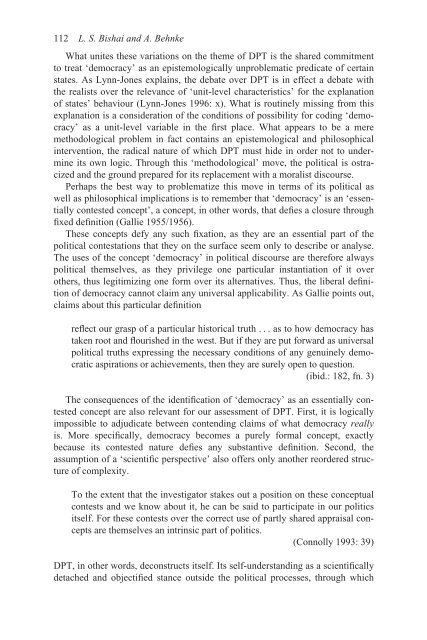The International Political Thought of Carl Schmitt: Terror, Liberal ...
The International Political Thought of Carl Schmitt: Terror, Liberal ...
The International Political Thought of Carl Schmitt: Terror, Liberal ...
You also want an ePaper? Increase the reach of your titles
YUMPU automatically turns print PDFs into web optimized ePapers that Google loves.
112 L. S. Bishai and A. Behnke<br />
What unites these variations on the theme <strong>of</strong> DPT is the shared commitment<br />
to treat ‘democracy’ as an epistemologically unproblematic predicate <strong>of</strong> certain<br />
states. As Lynn-Jones explains, the debate over DPT is in effect a debate with<br />
the realists over the relevance <strong>of</strong> ‘unit-level characteristics’ for the explanation<br />
<strong>of</strong> states’ behaviour (Lynn-Jones 1996: x). What is routinely missing from this<br />
explanation is a consideration <strong>of</strong> the conditions <strong>of</strong> possibility for coding ‘democracy’<br />
as a unit-level variable in the first place. What appears to be a mere<br />
methodological problem in fact contains an epistemological and philosophical<br />
intervention, the radical nature <strong>of</strong> which DPT must hide in order not to undermine<br />
its own logic. Through this ‘methodological’ move, the political is ostracized<br />
and the ground prepared for its replacement with a moralist discourse.<br />
Perhaps the best way to problematize this move in terms <strong>of</strong> its political as<br />
well as philosophical implications is to remember that ‘democracy’ is an ‘essentially<br />
contested concept’, a concept, in other words, that defies a closure through<br />
fixed definition (Gallie 1955/1956).<br />
<strong>The</strong>se concepts defy any such fixation, as they are an essential part <strong>of</strong> the<br />
political contestations that they on the surface seem only to describe or analyse.<br />
<strong>The</strong> uses <strong>of</strong> the concept ‘democracy’ in political discourse are therefore always<br />
political themselves, as they privilege one particular instantiation <strong>of</strong> it over<br />
others, thus legitimizing one form over its alternatives. Thus, the liberal definition<br />
<strong>of</strong> democracy cannot claim any universal applicability. As Gallie points out,<br />
claims about this particular definition<br />
reflect our grasp <strong>of</strong> a particular historical truth . . . as to how democracy has<br />
taken root and flourished in the west. But if they are put forward as universal<br />
political truths expressing the necessary conditions <strong>of</strong> any genuinely democratic<br />
aspirations or achievements, then they are surely open to question.<br />
(ibid.: 182, fn. 3)<br />
<strong>The</strong> consequences <strong>of</strong> the identification <strong>of</strong> ‘democracy’ as an essentially contested<br />
concept are also relevant for our assessment <strong>of</strong> DPT. First, it is logically<br />
impossible to adjudicate between contending claims <strong>of</strong> what democracy really<br />
is. More specifically, democracy becomes a purely formal concept, exactly<br />
because its contested nature defies any substantive definition. Second, the<br />
assumption <strong>of</strong> a ‘scientific perspective’ also <strong>of</strong>fers only another reordered structure<br />
<strong>of</strong> complexity.<br />
To the extent that the investigator stakes out a position on these conceptual<br />
contests and we know about it, he can be said to participate in our politics<br />
itself. For these contests over the correct use <strong>of</strong> partly shared appraisal concepts<br />
are themselves an intrinsic part <strong>of</strong> politics.<br />
(Connolly 1993: 39)<br />
DPT, in other words, deconstructs itself. Its self-understanding as a scientifically<br />
detached and objectified stance outside the political processes, through which
















